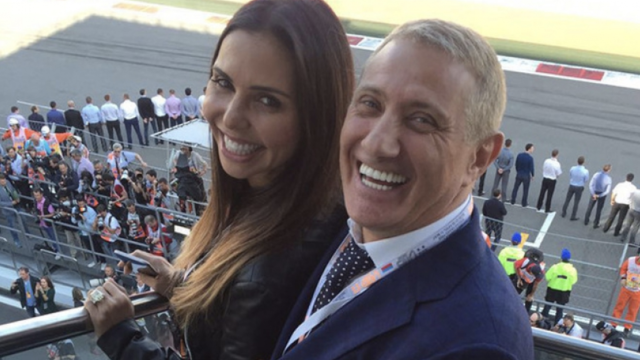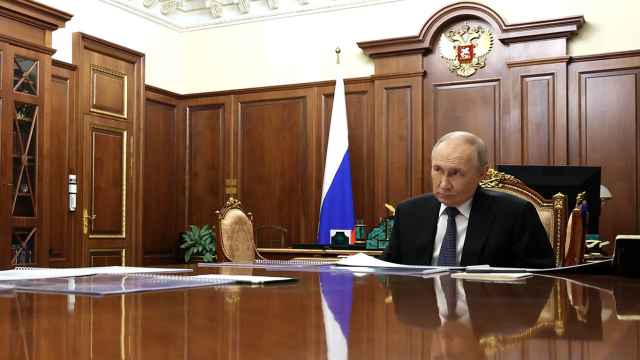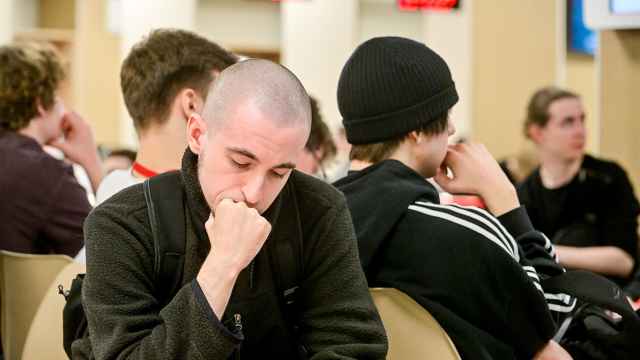Foreign Minister Sergei Lavrov on Thursday rejected claims that Russia would push for Syrian President Bashar Assad to cede power amid escalating violence.
"We are not supporting and will not support any external meddling," Lavrov said at a news conference at the ministry. He denied earlier media reports that Russia was ready to endorse a plan to oust the Syrian leader.
"Assad's fate should be decided by the Syrians themselves," he said.
About 10,000 people, mostly civilians, have been killed since the Syrian uprising began in March 2011, according to estimates by the United Nations. Assad admitted earlier this week that the country was at war, after months of blaming so-called foreign-funded extremists.
On Saturday in Geneva, the Action Group for Syria delegation, which includes the five permanent members of the UN Security Council, aims to draw up the principles for a coalition government to replace Assad's regime.
Russia and the United States are both members of the Security Council.
Lavrov was scheduled to meet with U.S. Secretary of State Hillary Clinton on Friday in St. Petersburg to discuss the situation in Syria and the Geneva gathering.
Russia was irritated that Iran, a neighbor of Syria and an ally to Russia, had been excluded from the Geneva meeting at the behest of the United States.
"Iran is undoubtedly a powerful player in the whole situation," Lavrov attested.
He also criticized the leaking of UN envoy Kofi Annan's plan for a transition government as "an improper approach to diplomacy."
Deputy Foreign Minister Gennady Gatilov agreed.
Creating a government of national unity can only be accomplished through dialogue between acting officials and all opposition groups, Gatilov tweeted on Thursday.
Russia has been a powerful friend to Assad, but analysts were divided about whether the Kremlin had decided to drop him.
"Moscow sees the reality and understands that Assad cannot hold on, therefore it is better to try and agree on something to ensure that Moscow's interests are taken into account by a future Syrian government," Fyodor Lukyanov, editor-in-chief of Russia in Global Affairs, told The Moscow Times.
"This is far from easy and not guaranteed that it will be successful because Assad, as far as I understand, has not agreed to go," Lukyanov said.
Georgy Mirsky, a professor at Moscow's Institute of World Economy and International Relations, said it was too soon to conclude that the Kremlin had given up on Assad.
"Russia still believes that Assad can win," Mirsky said by phone. "It is 50-50. Putin thinks it would be foolish to agree with the West that Assad's days are numbered and his regime is a basket case."
Siding with Western powers could take Putin down the same path as former President Dmitry Medvedev, who abstained from the UN resolution that paved the way for the toppling of Libyan dictator Moammar Gadhafi.
"The last thing Putin wants is for people to say 'Medvedev betrayed Gadhafi and Putin betrayed Bashar Assad,'" Mirsky said.
Anti-American attitudes, a hangover from Soviet days, continue to color the Kremlin's thinking, Mirsky said. "If Putin loses Syria, he is not a loser. But if he backs down under American pressure, then he is a loser."
Speaking in Riga on a European tour, Clinton called for the Action Group for Syria "to provide an opportunity to make real progress in supporting and implementing [Annan's] six-point plan and the roadmap for transition that he has laid down," The Associated Press reported.
On Thursday, Russia confirmed that it would send three attack helicopters to Syria, in line with a deal pre-dating the Arab Spring.
"Syria is our friend, and we meet all our obligations to our friends. According to the 2008 contract, we have repaired three Mi-25 helicopters, and we are ready to deliver them on time," said Alexander Fomin, director of the Federal Service for Military and Technical Cooperation, RIA-Novosti reported.
Meanwhile, expectations for Saturday's meeting are low. "I believe that nothing will come out of this meeting," Mirsky said.
"Both sides [in the Syrian conflict] believe that time is on their side," he said. "There is no motivation for them to engage in talks and dialogue to reach for a compromise solution."
Looking back to Russia's past, he added, "Can you imagine Vladimir Ilych Lenin sitting down with [White Army leader] Admiral Kolchak to discuss a coalition government? No, it's war to the bitter end."
U.S. Secretary of State Hillary Clinton speaking about Syria on Wednesday in Helsinki.
A Message from The Moscow Times:
Dear readers,
We are facing unprecedented challenges. Russia's Prosecutor General's Office has designated The Moscow Times as an "undesirable" organization, criminalizing our work and putting our staff at risk of prosecution. This follows our earlier unjust labeling as a "foreign agent."
These actions are direct attempts to silence independent journalism in Russia. The authorities claim our work "discredits the decisions of the Russian leadership." We see things differently: we strive to provide accurate, unbiased reporting on Russia.
We, the journalists of The Moscow Times, refuse to be silenced. But to continue our work, we need your help.
Your support, no matter how small, makes a world of difference. If you can, please support us monthly starting from just $2. It's quick to set up, and every contribution makes a significant impact.
By supporting The Moscow Times, you're defending open, independent journalism in the face of repression. Thank you for standing with us.
Remind me later.






